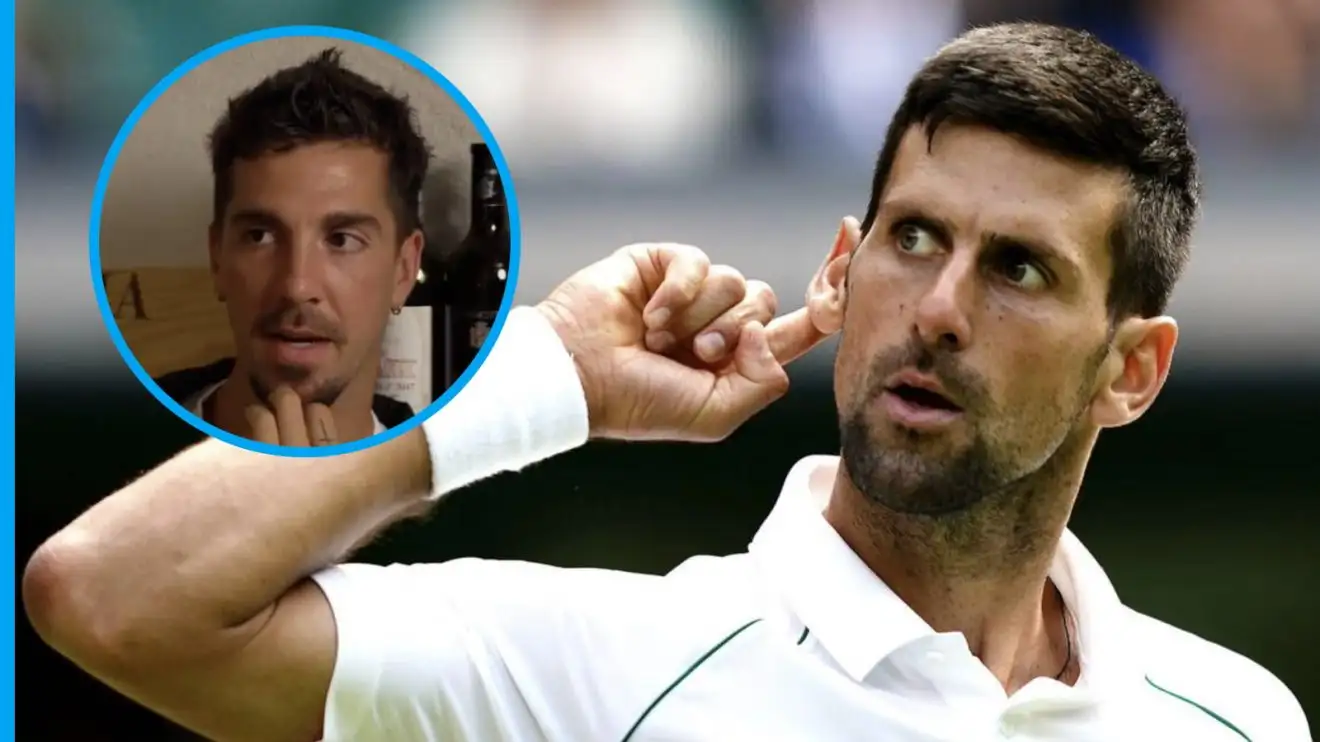
Novak Djokovic is undoubtedly one of the most celebrated tennis players of all time. With 24 Grand Slam titles, countless records, and an unyielding drive, the Serbian star has etched his name in tennis history. However, beyond his on-court brilliance lies another formidable force: his legion of fiercely loyal fans. This passionate following has often stirred controversy, intimidating players and pundits alike. Recently, Australian star Thanasi Kokkinakis joined the chorus of those who admit to being wary of Djokovic’s fervent supporters.
The Power and Fear of Djokovic’s Fanbase
The intensity of Djokovic’s fanbase is not a new phenomenon. Former world No. 1 Andy Roddick, now a prominent tennis analyst, has long spoken about the passionate—sometimes aggressive—nature of Djokovic’s supporters. Despite his repeated praise for the Serbian, Roddick finds himself a frequent target of their ire.
“I’m so scared of Nole’s Twitter people,” Roddick confessed earlier this year. “I say something like he was breathing heavily and even though he was breathing heavily, they are like ‘f*** you!’ I just eat s*** from them all the time.”
This admission from Roddick is telling. Despite his consistent acknowledgment of Djokovic’s greatness—Roddick was one of the first to publicly declare Djokovic as “the greatest”—he still faces backlash for the slightest perceived slight. The Served podcast host highlighted the relentless scrutiny he endures, underscoring the challenges faced by those who comment on Djokovic, even positively.
Kokkinakis’ Caution: The Crocodile Effect
Thanasi Kokkinakis, known for his candid nature, recently echoed Roddick’s sentiments. Speaking ahead of his participation in the Ultimate Tennis Showdown (UTS) Grand Final in London, the Australian shared his apprehension about Djokovic’s fervent fans. According to Kokkinakis, Djokovic supporters are easily recognizable on social media, particularly on X (formerly Twitter).
“In tennis Twitter, if you like Djokovic, everyone has this little Lacoste emoji,” Kokkinakis noted, referring to the crocodile symbol associated with Djokovic’s Lacoste sponsorship. “You know they are a Djokovic fan if they have that, and they are just abusing you.”
This symbol has become a badge of loyalty for Djokovic’s fans, and for many players and commentators, it signifies an impending barrage of criticism. Kokkinakis humorously warned his peers about the perils of inadvertently upsetting the Serbian star or his supporters.
“The worst is if the crowd makes him pissed. If he gets pissed and starts yelling at the crowd. Dude, pack your bags,” Kokkinakis remarked, emphasizing the psychological challenge of facing Djokovic when he’s fired up. “Keep him happy. Keep him happy.”
These comments underscore a broader sentiment in the tennis community: Djokovic’s fans are a force to be reckoned with, and their influence extends beyond social media.
The UTS Grand Final: High Stakes and High Tensions
The UTS Grand Final, set to begin on December 6 in London, adds an intriguing dimension to this ongoing narrative. This innovative tournament, created by renowned coach Patrick Mouratoglou, features a fast-paced format designed to attract new audiences. While Djokovic himself won’t be participating, the event serves as a microcosm of the modern tennis landscape, where off-court dynamics often rival the action on the court.
Kokkinakis and fellow competitors, including Denis Shapovalov, will not only be vying for victory but also navigating the complex web of fan expectations and social media scrutiny. In this era of heightened connectivity, every match, comment, and gesture is subject to intense analysis—and potential backlash.
Djokovic’s 2024 Campaign: A Mixed Bag
As the 2024 season draws to a close, reflections on Djokovic’s performance add further context to this conversation. Despite his unparalleled success in recent years, Djokovic faced challenges this season. Patrick Mouratoglou, speaking to Tennis365, offered his perspective on the Serbian’s year.
“I think Novak had a very bad year, but it came after an incredible year,” Mouratoglou noted. “Let’s not forget that only last year he won three Grand Slams and played in the final of the other. So we shouldn’t forget that was just one year ago, not ten years ago.”
Indeed, 2023 saw Djokovic dominate the tennis world, capturing three of the four Grand Slam titles and narrowly missing the fourth. This year, however, the landscape shifted. Rising stars like Jannik Sinner and Carlos Alcaraz have closed the gap, challenging Djokovic’s supremacy. Mouratoglou remains confident in Djokovic’s ability to reclaim his throne.
“He won the Olympics, which was his main focus this year, beating Carlos in the final, playing fantastic tennis, so he is not far away,” Mouratoglou continued. “I think he can beat them (Sinner and Alcaraz). It’s very hard; there was a lot of margin before, but now there is none.”
The Road Ahead: Can Djokovic Silence the Doubters?
Looking ahead to 2025, the stakes are higher than ever for Djokovic. While some critics have suggested that his dominance may be waning, Mouratoglou and others believe he still has what it takes to win. “When he plays them, I think anyone can win, but I don’t think he’s far behind. I think he can still win Grand Slams, I’m sure about it.”
This confidence is well-founded. Djokovic has faced adversity throughout his career, often emerging stronger. His ability to channel external pressures—whether from media scrutiny, crowd hostility, or social media storms—into on-court brilliance is legendary. As Kokkinakis aptly noted, Djokovic thrives when provoked, turning adversity into fuel.
Conclusion: More Than a Game
The fervent loyalty of Djokovic’s fans is both a testament to his greatness and a reflection of the intense emotions he evokes. For players like Kokkinakis and Roddick, navigating this passionate fanbase is part of the modern tennis experience. As the sport continues to evolve, the intersection of performance, personality, and social media scrutiny becomes increasingly complex.
The UTS Grand Final, with its blend of innovation and competition, symbolizes this new era. And as Djokovic prepares for another chapter in his storied career, the debate over his legacy—and the fervor of his supporters—shows no signs of fading. For better or worse, Djokovic’s influence extends far beyond the court, shaping the very fabric of the tennis world.
Leave a Reply